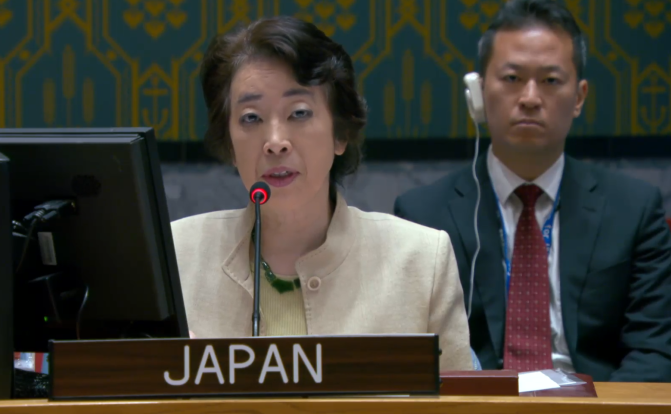シリア政治・人道情勢に関する安保理会合における志野大使ステートメント
令和6年7月22日

(As delivered)
I thank Special Envoy Pederson and OCHA Director Mr. Rajasingham for their valuable briefings.
The Syrian crisis remains unresolved with no end in sight. The humanitarian situation has never been worse. The economy is in freefall. 90% of Syrians are in poverty. This is clearly unsustainable.
Given the lack of political momentum or will on Syria, there is a serious concern that the international community shifts its focus on other crises around the world. But, as Special Envoy stated, we should not forget the Syrian people, nor the instability in the region caused by the continuation of their plight.
Japan is engaging with the Syrian government on a variety of issues including on the political track, early recovery, refugee and IDP returns, and relations with the broader international community.
Today, I would like to focus on three points.
First, while the political stalemate unfortunately persists, Japan firmly believes that only a political solution in line with Security Council Resolution 2254 can pave the path towards a stable and peaceful Syria.
Japan therefore reiterates its call for the reconvening of the Constitutional Committee and the finding of a suitable venue without delay. Japan strongly supports Special Envoy Pedersen and his team’s tireless efforts to this end and urges all parties to engage with him in good faith.
We further value the ongoing Arab Initiative, in particular the work of the Arab Contact Group, and hope to see an early holding of the Ministerial meeting in Baghdad.
Second, turning to the humanitarian file, it is deeply concerning that even as needs continue to increase, funding for the Humanitarian Response Plan remains insufficient.
More than half of the population face high levels of acute food insecurity; safe water and sanitation services have been disrupted in northern Syria; and a third of the country’s children live in food poverty.
The UN cross-border operation remains a lifeline for millions of people in northwest Syria. Japan therefore welcomes the Syrian government’s decision to extend the use of the Bab al-Hawa crossing for an additional six months.
Early recovery and resilience assistance will complement humanitarian relief efforts. This year Japan has already given 65 million USD across a range of early recovery assistance to help Syrians rebuild their lives, including the recent restoration of the Aleppo children’s hospital in close cooperation with UNDP and WHO.
Thirdly, on the security front, violence and instability continue to deepen and spread across the region. Tensions in the Golan Heights, the sharp increase of ISIL attacks, and airstrikes allegedly by Israel targeting sites in Syria are all causes for concern.
De-escalation on all fronts is urgently needed to avoid further civilian casualties and volatility. Let us not forget that the growing security tensions negatively affect the conditions for the safe, voluntary and dignified return of refugees.
The Syrian people have already suffered through 14 years of conflict and deserve to live prosperous lives. Japan will spare no effort towards this end.
I thank you.
